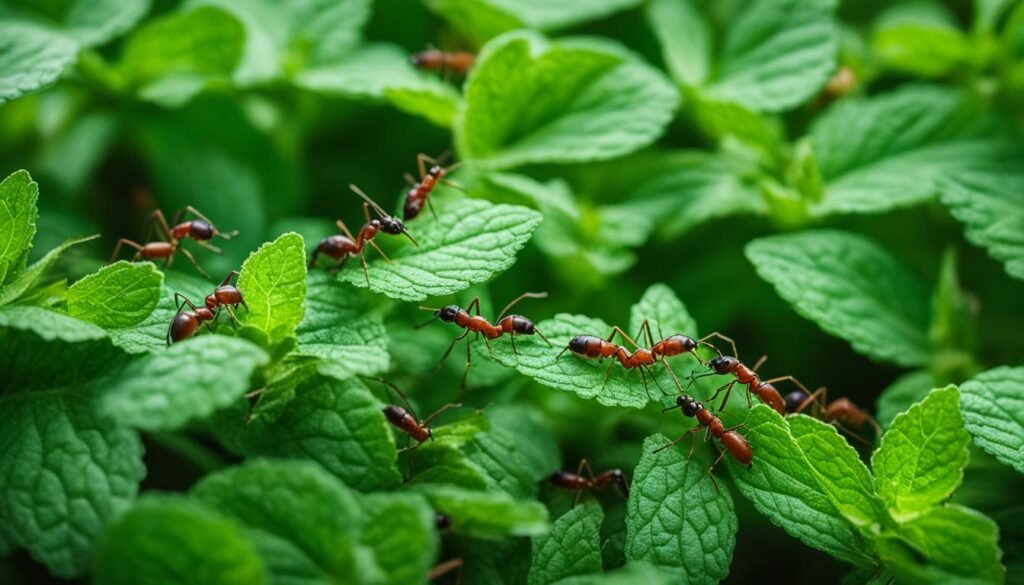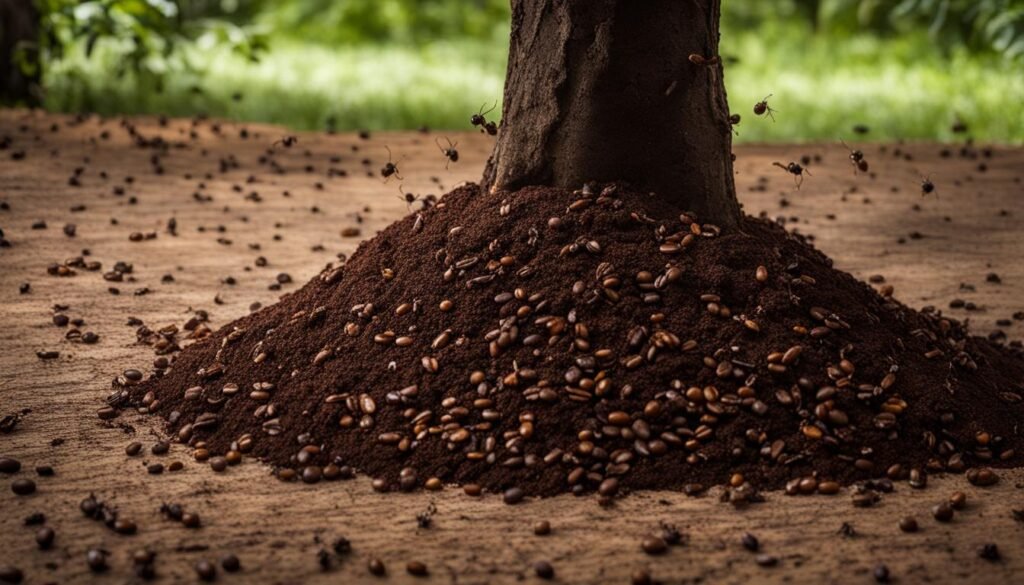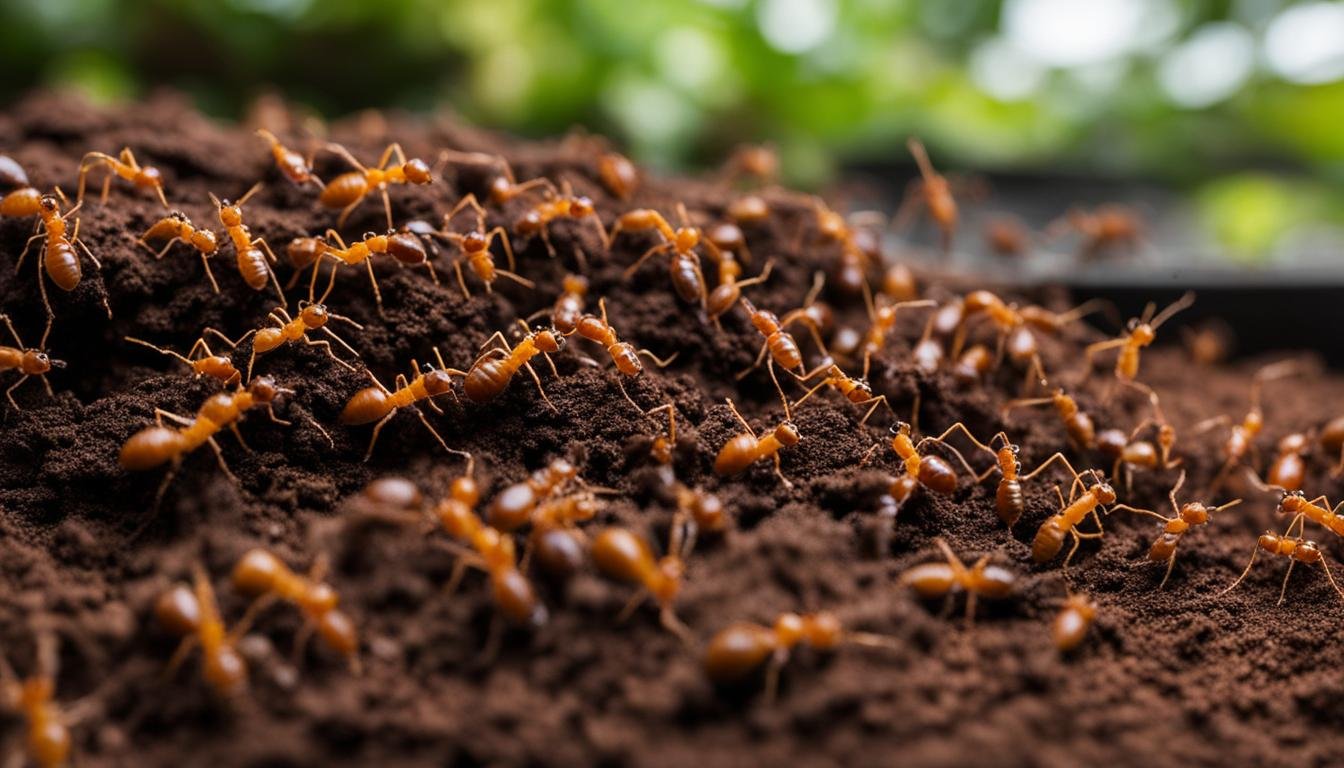Have you ever wondered if coffee grounds can repel ants? It’s a popular belief that coffee grounds are a natural ant repellent, but is there any truth to this claim? Let’s explore the relationship between coffee grounds and ants to determine if they can truly keep these pesky insects at bay.
As coffee farmers in Brazil have observed, ants often climb coffee trees and discard the beans outside their anthills. This observation sparked curiosity about the effect of coffee grounds on ants. It is believed that coffee grounds contain caffeine, nitrogen, and other compounds that may disrupt ants’ sensory systems, making them less likely to venture near.
Key Takeaways:
- Coffee grounds are often recommended as a natural way to repel ants in gardens and households
- Scientific studies on the specific effects of coffee grounds on ants are limited
- The effectiveness of coffee grounds as an ant repellent can vary depending on the ant species and environmental factors
- Other natural ant repellents, such as essential oils and spices, can also be used in combination with coffee grounds
- For a more effective and long-term solution, it is recommended to consult a professional pest control service
How to Use Coffee Grounds to Repel Ants
If you’re looking for a DIY ant repellent that is natural and effective, coffee grounds can be a great option. Here’s how you can use coffee grounds to keep ants away:
- Identify entry points: Start by identifying the areas where ants are entering your home. Look for cracks, gaps, or any other openings that ants can use as entry points.
- Clean the areas: Use a vacuum cleaner to clean the areas around the entry points. This will help disrupt the ants’ communication and make it harder for them to navigate.
- Create a barrier: Sprinkle coffee grounds at the entry points to create a barrier that ants will be reluctant to cross. Coffee grounds contain compounds that disrupt ants’ sensory system.
- Reapply regularly: To maintain the effectiveness of the coffee grounds, reapply them every 12 to 16 hours. This will ensure that the barrier remains strong and deters the ants.
Additionally, it’s important to dispose of used coffee grounds properly. Consider composting them or using them as a natural fertilizer in your garden. This way, you can both repel ants and benefit your plants.
By using coffee grounds as a natural ant repellent, you can take a proactive approach to pest control without relying on chemical solutions. It’s a cost-effective and environmentally friendly way to keep ants at bay.
The Effectiveness of Coffee Grounds as an Ant Repellent

When it comes to using coffee grounds as an ant repellent, many people wonder just how effective they are. The truth is, the effectiveness of coffee grounds in repelling ants can vary depending on several factors. While some anecdotal evidence suggests that coffee grounds can deter ants, there is limited scientific research on their specific effects.
Coffee grounds contain various compounds that may contribute to their potential repellent properties. These include caffeine, phenolic compounds, volatile organic compounds (VOCs), fatty acids, diterpenes, and nitrogenous compounds. These compounds have the potential to disrupt ants’ sensory perception and trails, creating an aversive smell that may deter them from entering certain areas.
However, it’s important to note that scientific studies on the effectiveness of coffee grounds as an ant repellent are still lacking. While coffee grounds may confuse ants’ sensory system and create a temporary barrier, their long-term efficacy is yet to be fully understood. Therefore, while coffee grounds can be used as part of a holistic approach to ant control, it is recommended to consult a professional pest control service for a more effective and long-term solution.
Factors Affecting the Effectiveness of Coffee Grounds as an Ant Repellent
- The specific ant species: Different ant species may respond differently to coffee grounds. Some ants may be repelled by the odor, while others may be attracted to it.
- Environmental factors: The effectiveness of coffee grounds may also be influenced by environmental factors such as humidity, temperature, and the presence of other food sources.
- Application method: The way coffee grounds are applied can also impact their effectiveness. Sprinkling coffee grounds at entry points and regularly reapplying them may yield better results than using them sporadically.
In conclusion, while coffee grounds may have some potential as an ant repellent, their effectiveness can vary, and further research is needed to fully understand their capabilities. Using coffee grounds as part of a comprehensive approach to ant control, along with proper cleaning and sealing of entry points, may provide some temporary relief. However, for a more effective and long-term solution, it is best to consult with a professional pest control service.
Other Natural Ant Repellents

While coffee grounds can be an effective natural ant repellent, there are other options available as well. Here are some additional natural remedies that can help you keep ants at bay:
Essential Oils
Essential oils like peppermint, tea tree, and citrus oils have strong scents that ants find unpleasant. Simply mix a few drops of these oils with water and spray the solution around entry points and areas where ants are present. The strong scent will deter ants from entering your home.
Cinnamon
Cinnamon is known for its strong aroma and can be an effective ant repellent. Sprinkle ground cinnamon around windowsills, doorways, and other areas where ants may enter. You can also create a cinnamon spray by boiling cinnamon sticks in water and using the solution as a natural ant deterrent.
Cayenne Pepper
Cayenne pepper is a natural ant repellent due to its strong and spicy scent. Sprinkle cayenne pepper powder near ant trails and entry points to deter ants from entering your home. Remember to reapply the pepper regularly, especially after rain or cleaning.
These natural ant repellents can be used individually or in combination with coffee grounds for enhanced effectiveness. It’s important to keep in mind that while these remedies may help control ants, they may not completely eliminate the problem. If you’re dealing with a severe ant infestation, it’s recommended to consult a professional pest control service for a more comprehensive solution.
Coffee Grounds and Pest Control

When it comes to pest control, coffee grounds can be a handy tool in your arsenal. Not only can they help repel ants, but they can also deter other unwanted insects. Burning coffee grounds, for example, can act as a natural mosquito repellent, making your outdoor activities more enjoyable. The strong scent of coffee grounds can also discourage other insects and pests from invading your space.
In addition to their repelling properties, coffee grounds can be beneficial for your garden. By adding coffee grounds to the soil, you can provide nitrogen, which is essential for the growth of flowering plants. This natural fertilizer can contribute to healthier and more vibrant blooms. Moreover, spreading coffee grounds around your garden can create a physical barrier that keeps pests away from your plants.
Using Coffee Grounds in Your Garden
If you’re considering using coffee grounds in your garden, it’s important to exercise caution. While coffee grounds can be beneficial, over-saturating the soil with them can have negative consequences. Excessive amounts of coffee grounds can harm earthworm populations, which play a vital role in soil health. Additionally, using too much coffee grounds can disrupt the composting process.
To make the most of coffee grounds in your garden, consider using them in moderation and in combination with other organic materials. This will ensure a balanced approach to pest control and promote a healthy ecosystem within your garden. Remember, coffee grounds should be part of a holistic strategy that includes proper sanitation, eliminating food and water sources for pests, and seeking professional pest control services when necessary.
The Versatility of Coffee Grounds
So, the next time you make a cup of coffee, think twice before throwing away the grounds. By repurposing them as a natural pest deterrent in your home and garden, you can contribute to a greener and pest-free environment. Coffee grounds truly are a versatile resource that can be both environmentally friendly and effective in keeping unwanted pests at bay.
Conclusion
In conclusion, coffee grounds can be a valuable tool in our quest for pest control. As a natural ant repellent, coffee grounds offer an environmentally friendly solution to keep ants at bay. Although their exact effectiveness may vary, coffee grounds contain compounds that can disrupt ants’ sensory system and trails, making them an ideal natural ant repellent.
However, it’s important to note that coffee grounds should be used as part of a holistic approach to ant control. While they can create a barrier and deter ants, it’s also crucial to identify and eliminate entry points, keep the area clean, and remove potential food and water sources for ants.
Additionally, combining coffee grounds with other natural ant repellents, such as essential oils and spices, can enhance their effectiveness. By utilizing a multi-faceted approach, we can optimize our efforts to keep ants away and create a pest-free environment.
For those seeking a more comprehensive and long-term solution, consulting a professional pest control service is always recommended. They have the expertise and knowledge to address ant infestations and provide targeted solutions tailored to the specific needs of your home or garden.
FAQ
Do coffee grounds repel ants?
Coffee grounds are often recommended as a natural way to repel ants in gardens and households. However, new studies suggest that some ants are actually attracted to coffee odor, particularly Arabica varieties.
How can I use coffee grounds to repel ants?
To use coffee grounds as an ant repellent, start by identifying the entry points of ants in your home. Clean those areas with a vacuum cleaner and soapy water to disrupt ants’ communication. Sprinkle coffee grounds at the entry points to create a barrier and deter ants from crossing. Reapply the coffee grounds every 12 to 16 hours to maintain the barrier. Dispose of used coffee grounds properly, considering composting or using them as a natural fertilizer.
Are coffee grounds effective in repelling ants?
The effectiveness of coffee grounds as an ant repellent can vary depending on the ant species and environmental factors. While coffee grounds contain compounds that may disrupt ants’ sensory system and trails, scientific studies on their specific effects on ants are limited. However, they can be used as part of a holistic approach to ant control.
Are there other natural ant repellents?
Yes, besides coffee grounds, other natural ant repellents can be effective. Essential oils like peppermint, tea tree, and citrus oils are commonly used to repel ants. Cinnamon, cayenne pepper, white vinegar, cloves, and diatomaceous earth can also be used to repel ants. Sprinkle these substances on entry points and areas where ants may be entering. Keeping the area clean and eliminating sources of food and water for ants is also important in ant control.
Can coffee grounds be used for other pest control?
Yes, coffee grounds can be used not only to repel ants but also to repel other pests. Burning coffee grounds can act as a natural repellent for mosquitoes. Other insects and pests may also be deterred by the strong scent of coffee grounds. In gardens, coffee grounds can benefit flowering plants, add nitrogen to the soil, and create a physical barrier against pests.
Are there any precautions when using coffee grounds?
When using coffee grounds as a natural ant repellent, caution should be exercised to avoid oversaturating the soil, as it can harm earthworms and affect the composting process. It is recommended to consult a professional pest control service for a more effective and long-term solution.

Leave a Reply